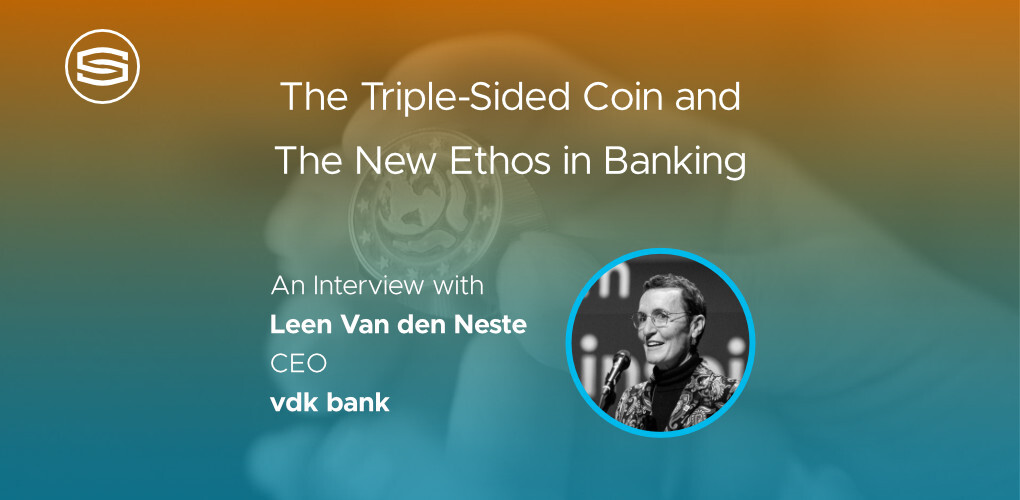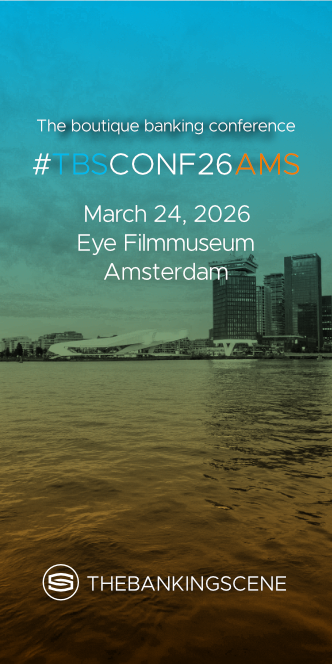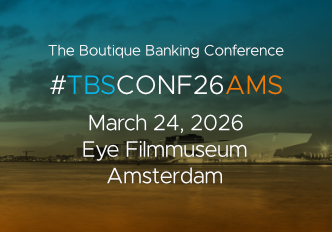
Insights & Opinions
The Triple-Sided Coin and The New Ethos in Banking
Mon, 17 Jun 2024


Leen Van den Neste, CEO of vdk bank, joined us last year at The Banking Scene Conference 2023 Brussels to discuss the new ethos in banking, and for the first time, she showed their triple-sided coin to the world. It is a unique symbol that raises awareness of how banks can leave a positive footprint.
It was impossible to ignore this story on the road to a new ethos in banking regarding the book I am writing.
I've been researching the history of banking for my book, and I've concluded that many banks were initially established with the values many fintechs claim today. They identified a need in their community and set up a business to fulfil that need. vdk bank is one of those banks. Can you give the readers a brief background about the bank and its foundations?
vdk bank was founded in 1926 by textile unions in Ghent. These unions were concerned about the workers getting paid in cash and often had little money left for their families after spending some at the bars on their way home. Since the big banks were not interested in serving this type of clientele, the unions and organisations of Ghent decided to establish a bank to provide financial inclusion for the workers. Social and financial inclusion has been the primary goal of vdk bank since its inception in 1926, and it continues to be a core value throughout its history.
In 1992, for example, we established IncoFin, which did the same across the world. In other continents, such as South America and Asia, they financed microfinance institutions to do the same thing. They provided investment money to help poor people invest in things like a small shop, a cow, or a garden so they could provide for their families. These are all funded foundations, and we are very proud of them. We continue to work in the same way.
It's currently very common in the media to hear about the challenges people face in buying new homes due to the high costs and renovation expenses. We focus on finding ways to make it feasible for single individuals and small families to afford and invest in a home with a good Energy Performance Certificate (EPC) rating. We are exploring options such as co-housing and financing tiny houses to address this issue and make homeownership a reality for more people.
A few years ago, you participated in one of our virtual sessions and shared the following: “Our mission statement is to be a bank for the customer, the region, and the good of the planet we live on. This commitment is ingrained in our DNA and originated from the time of our establishment through unions. We have operated with this mindset for almost 100 years and intend to continue doing so. Thus, we aim for a positive social impact through our banking system as a whole.” Can you provide more specific examples? Although you mentioned a few already, the idea of striving for a social impact through our banking system is quite ambitious.
The work we do is essential. I've already explained how we aim to promote financial and social inclusion. Our goal is to ensure everyone has access to the financial products they need, whether through digital or in-person channels.
Our mission is not only to provide customers with good returns on their investments, but also to benefit the environment, the local region, and the planet. We focus on investing savers' money locally, providing local loans to individuals for their homes and small businesses and organisations in the region. We also consider the impact on the planet, particularly on climate change.
The environment and environmental issues are important to us, so we choose not to invest in fossil fuels. We want to work with three primary beneficiaries: our customers, our local region, and the planet. Our customers have a right to receive good returns on their money from a bank that takes care of their finances and provides them with loans. We focus on providing loans to the local community for their activities. Our ultimate goal is to ensure that our children, grandchildren, and future generations have a beautiful planet to live in. As I will soon have my first grandchild, this is more than a corporate goal but a personal mission.
The book I'm writing has a main title “A New Ethos in Banking” and is subtitled “embracing ethics and values for meaningful transformation”. How would you define the concept of a new ethos in banking?
In my opinion, banks have a significant responsibility. Our customers entrust us with their savings, expecting us to manage them well so that they can retrieve them when needed, along with some interest revenues. They want us to use their money wisely. For example, our customers don't want us to invest in fossil fuels, weapons, or child labour. Therefore, being a bank entails a major responsibility.
I believe that as a banker, you must invest the money customers save with you in ways that align with their preferences. This should be the new ethos of banking, regardless of the type of bank - whether it's a digital bank, one like vdk bank that offers both digital and personal services, a big bank, or a universal bank. It's crucial that you invest your customers' money according to their wishes. We need to consider that customers entrust their money to banks with the expectation that it will be managed as they desire.
A frequent comment is that small banks can much more easily make drastic decisions for a better planet than big banks, which need to consider much bigger pictures in their decisions to build that better planet. What do you think about that statement?
I have a different perspective. New banks have an advantage because they can start from scratch and choose where to invest their money, unlike established banks like ours, which already have existing investments. For example, 20 years ago, when climate change was not as significant, we invested in fossil fuels. Now, we have to divest from these investments, which puts us at a disadvantage. On the other hand, new banks can use all their funds for good purposes without having to manage an existing portfolio.
So, the age of a bank is more important than the size in that respect? The comment comes from executives at large banks who argue that if they were to stop investing in fossil fuels, it could potentially bring down entire economies, such as in Africa. They believe that supporting the transition and guiding energy companies investing in these areas will have a bigger impact than simply ceasing investments.
What they say is indeed true, and it applies to us as well. They may have a greater impact, but that also means they have greater leverage. Therefore, they can effectively collaborate with companies and exert pressure on them to invest in new technology and phase out the use of fossil fuels. They wield significant power and should use it for the betterment of the planet.
Last year, you launched a campaign with the triple-sided coin designed to triple people's thinking at our conference in Brussels. Chris Skinner still makes me jealous because he has one of those coins, and I don't. Could you please provide more details about the purpose of that campaign?
It's important to remember that people must carefully consider where they invest their money. I have the opportunity to speak with various individuals at schools and organisations, and I'm always surprised that many people need to be made aware of the impact their choice of bank can have. They may not realise that banks use their money for investments. Some assume that if a bank is environmentally responsible, it simply means they have solar panels on their buildings and electric cars for their employees. However, there's more to it than that.
People must consider how their money is invested by their bank. Specifically, they should consider where they can earn revenue and interest, what impact the bank has on their community, and what the bank's overall impact on the environment is. These are the three key things customers should think about when choosing a bank, and that was what the campaign of that coin as about.
What was the concrete impact of that campaign on the bank and its audience?
Yeah, well, just as you said, some people were jealous when they did not receive one. It was remarked by a lot of people. Finally, we got one to Christine Lagarde, who received one, and the minister of finance also received one. So, we really promoted it. They all said it was a very remarkable and beautiful coin. It made people more aware, and we have gained a lot of new customers since then. I think it was the way we talked about ourselves and what we do with the customers' money that made it worth our while.
vdk bank is also a member of the Global Alliance for Banking on Values. We had an interview with their Executive Director, Martin Rohner. How does being a member of this alliance help you improve your initiatives to fulfil your commitment to people, society, and the planet?
They are leading the way in ethical banking and banking with values, which is a beautiful concept. They make us aware of how banking on values can be achieved. We meet with bankers from around the world and around Europe once or twice a year to discuss best practices and share inspirational stories.
I remember attending a meeting in Nürnberg last November. A Greek banker was present, discussing how they provide banking services for refugees in Greece. This is a challenging task since many refugees do not speak the local language and lack proper identification. However, the banker's approach was very enlightening (they had their online bank environment in Greek and Arabic language for example). It demonstrated how we can learn from each other's experiences.
Other banks, like Triodos, are more focused on addressing climate change. They are pioneers in adopting new technologies to mitigate climate change and consider ecological and social components important. They aim to include everyone in the banking system, including poor and marginalised individuals. It's always interesting to have conversations with them. We’ve also inspired them with our triple-sided coin. We inspire each other toward excellence in banking. This makes it essential and fulfilling for us to participate in this initiative.


